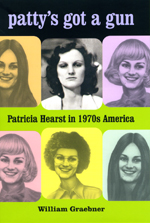The Heiress as Urban Guerilla
 Thirty-five years ago today, on February 4, 1974, 19-year-old Patty Hearst, daughter of newspaper magnate Randolph Hearst, was kidnapped from her Berkeley, Calif., apartment by armed members of the Symbionese Liberation Army. Nine weeks later, Hearst, along with her captors and conspirators, robbed a San Francisco bank. After more than a year on the lam, Hearst was captured on September 18, 1975 and convicted of armed robbery in March 1976. She served only twenty-one months of her seven-year sentence before it was commuted by President Jimmy Carter. In 2001, Patty Hearst was pardoned by President Bill Clinton.
Thirty-five years ago today, on February 4, 1974, 19-year-old Patty Hearst, daughter of newspaper magnate Randolph Hearst, was kidnapped from her Berkeley, Calif., apartment by armed members of the Symbionese Liberation Army. Nine weeks later, Hearst, along with her captors and conspirators, robbed a San Francisco bank. After more than a year on the lam, Hearst was captured on September 18, 1975 and convicted of armed robbery in March 1976. She served only twenty-one months of her seven-year sentence before it was commuted by President Jimmy Carter. In 2001, Patty Hearst was pardoned by President Bill Clinton.
The bizarre story of brainwashed heiress captured a nation’s attention, and, even today, the sensational tale seems to defy belief. But William Graebner sees the robbery—and the spectacular 1976 trial that ended with Hearst’s criminal conviction—as oddly appropriate to the troubled mood of the nation at the time, an instant exemplar of a turbulent era.
In Patty’s Got a Gun: Patricia Hearst in 1970s America, the first substantial reconsideration of Patty Hearst’s story in more than twenty-five years, Graebner vividly re-creates the atmosphere of uncertainty and frustration of mid-1970s America. Drawing on copious media accounts of the robbery and trial—as well as cultural artifacts from glam rock to Invasion of the Body Snatchers—Graebner paints a compelling portrait of a nation confused and frightened by the upheavals of 1960s liberalism and beginning to tip over into what would become Reagan-era conservatism, with its invocations of individual responsibility and the heroic. Trapped in the middle of that shift, the affectless, zombielike Hearst was a ready-made symbol of all that seemed to have gone wrong with the sixties—the inevitable result, some said, of rampant permissiveness, feckless elitism, the loss of moral clarity, and feminism run amok.
By offering a fresh look at Patty Hearst and her trial—for the first time free from the agendas of the day, yet set fully in their cultural context—Patty’s Got a Gun delivers a nuanced portrait of both an unforgettable moment and an entire era, one whose repercussions continue to be felt today.
Read an excerpt of the book and listen to an interview with the author.